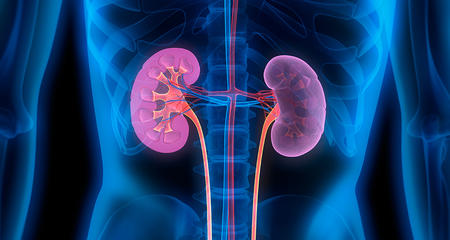Diabetes (diabetes mellitus) is a chronic condition that develops when the body cannot maintain normal blood glucose (sugar/starch) levels — either because the body cannot use insulin properly or no longer makes insulin. Insulin is the key hormone made in the pancreas that, along with other hormones, enables the body to control glucose levels and to make/store the energy we need for life.
High blood sugars (hyperglycemia) lead to many symptoms including fatigue, frequent urination, increased thirst, weight loss, blurry vision and nausea/vomiting. If severe enough, the condition can lead to hospitalization. Hyperglycemia present for years can lead to permanent damage of the eyes, kidneys, nerves, heart, brain and many other parts of our bodies that will affect both quality and duration of life.
Diabetes is the most common endocrine disease affecting more than 10 % of the U.S. population (more than 7% of Wisconsinites). Across all ages, the number of people with diabetes is rapidly increasing, but many people are not even aware they have diabetes.
Types of Diabetes
There are several types of diabetes. Type 1 diabetes (T1D) and type 2 diabetes (T2D) are the most common.
Prediabetes
Prediabetes describes elevated blood sugar levels that are not yet high enough to diagnose diabetes (see below). Other common terms include: “at-risk for diabetes”, impaired fasting glucose, impaired glucose tolerance, or borderline hemoglobin A1c (A1c). In many cases, improvements made to diet and exercise habits or medications can help prevent or delay diabetes.
Type 1 Diabetes (T1D)
Type 1 diabetes is an autoimmune condition caused by immune cells destroying the insulin-producing cells of the pancreas and loss of insulin. T1D is frequently diagnosed in childhood, but can also develop in adults. T1D affects up to 10% of people with diabetes in the United States. Treatment requires individuals to give themselves insulin, typically with injections or by using an insulin pump.
Type 2 Diabetes (T2D)
Type 2 diabetes is resistance to the body’s own insulin, despite the pancreas generally producing higher amounts of insulin than usual. Eventually the body cannot produce enough insulin and blood sugars rise. Insulin resistance can result from unhealthy diets, lack of exercise or in people who have many other relatives with diabetes. Treatment is centered around changing diet and exercise habits, non-insulin medications (oral and injectable) and/or insulin.
Gestational Diabetes
During pregnancy, women who did not previously have diabetes become much more resistant to insulin leading to high blood sugar levels that affect fetal and maternal health. Gestational diabetes may affect up to 10% of pregnant women. Many women return to normal blood sugar levels after delivery, but up to 50% of women with gestational diabetes develop T2D after pregnancy.
Other Forms of Diabetes
Various conditions affect how the body produces insulin and regulates blood sugar. These conditions include:
- Cystic fibrosis
- Genetic conditions
- Disorders involving the pancreas (cancer, surgery or injury)
- Medication-related
- Other endocrine disorders
Cystic fibrosis, pancreas surgery or people with diabetes who undergo solid organ or bone marrow transplantation receive glucocorticoids, which cause blood sugar levels to rise and make diabetes management more challenging. Froedtert & MCW endocrinology clinicians are knowledgeable and experienced in treating people with all forms of diabetes and in those who have other health conditions that add complexity to diabetes management.
Patients with other health problems may have increased insulin needs or insulin sensitivity or may have special nutrition needs. These patients also tend to require more hospitalizations. Froedtert & MCW endocrinology clinicians and other members of the diabetes team follow these patients through the continuum of their care — from outpatient to inpatient. Our diabetes care teams coordinate care with other health care teams to ensure the best diabetes care.
Testing for Diabetes
Diabetes can be diagnosed by a few simple and different blood tests. You should discuss the appropriateness of diabetes screening with your primary care team.
Diabetes Diagnosis
Diabetes is diagnosed when:
- Hemoglobin A1c ≥ 6.5%
- Fasting blood hlucose ≥ 126 mg/dL
- 2-hour oral glucose tolerance test (GTT) glucose level ≥ 200mg/dL
- Blood glucose level ≥ 200mg/dL + Symptoms of Hyperglycemia
*All positive testing should be confirmed on repeat measurements.
Prediabetes or Impaired Glucose Tolerance
Prediabetes or impaired glucose tolerance is diagnosed when:
- Hemoglobin A1c is between 5.7 and 6.4%.
- Fasting blood glucose is between 100 and 125 mg/dL.
- 2-Hour oal GTT blood glucose is between 140 and 199 mg/dL.
Recognized as High Performing by U.S. News & World Report
Froedtert Hospital is recognized as high performing by U.S. News & World Report in three adult specialties and 16 procedures and conditions, including diabetes care.More to Explore





